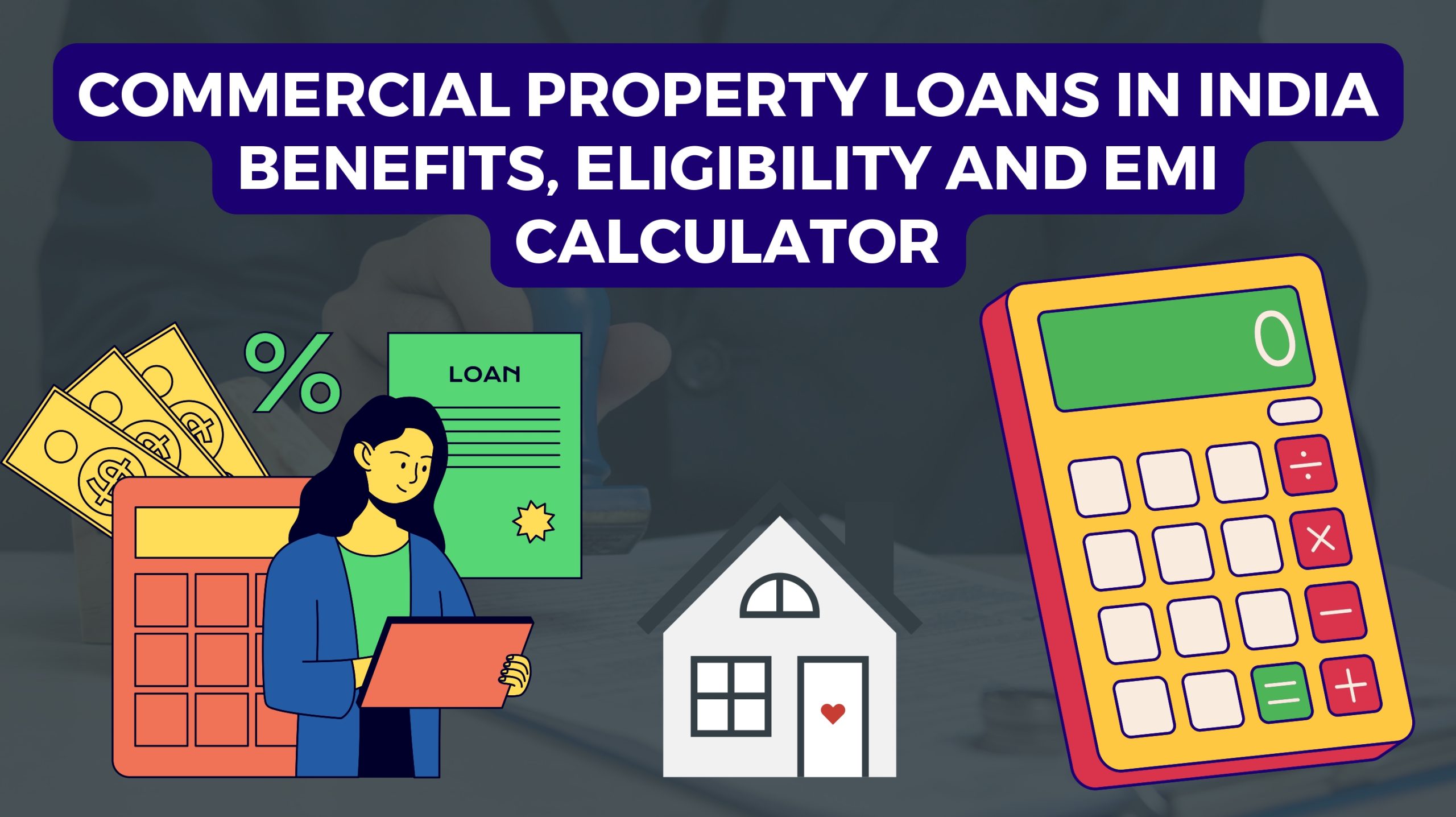Table of Contents
Real estate was previously only used for domestic auxiliary purposes, but country roof, an expanding economy, and the modern revolution have transformed the game. Today, commercial real estate is in the spotlight and offers investors a variety of alternatives.
Commercial real estate is predicted to increase at a CAGR of 13% from 2022 to 2027, which is faster than the nation’s overall rate of growth for this industry. Additionally, inflation is at its highest point as a result of the rise in repo rates. It’s possible that classic investment types like bonds and FDs won’t matter in the future. The only asset class that offers an inflation hedge at this time is real estate. This blog will be very helpful if you’re looking to multiply your assets through commercial property loans or invest in commercial real estate holdings.
What is a Commercial Property Loan?
Commercial loans give you the freedom to invest in any non-commercial or commercially oriented assets. Commercial loans, however, differ from mortgage and personal loans. They may be used to increase leverage. Imagine a person by the name of “Taarush” For his business property, he obtains a Rs. 1 lac loan with a 6% interest rate. The debt’s current EMI was Rs. 60,000.
Taarush received Rs. 70,000 in rent each month. He was wise and always made on-time payments on his EMIs from the rental revenue! He also had a spare 10,000 rupees in his hand. Commercial real estate typically has an annual rental yield of 9% to 12%. Recall what the interest rate was. Yes! It was 6%. In order to increase leverage, Mr. Taarush, who was skilled at managing loans, took out commercial loans.
If this has sufficiently piqued your interest, let’s explore the many forms of commercial loans.
A Loan Secured by Commercial Real Estate
By mortgaging a commercial property you already own, you can use the loan against it to buy another commercial property, company assets, or any other profit-generating reason. If you need sufficient, cheap finance, for instance to develop your firm or purchase expensive machinery, you can choose a commercial property loan.
Benefits of Borrowing Against Commercial Property Include:
- Lower Interest Rates — Because you have a consistent stream of business, commercial mortgages are very secure. Commercial mortgages are trusted by the banks and so have lower interest rates than educational and personal loans because there is less assurance of timely repayments.
- Simple Application Process — Unlike other loan kinds, which call for copious amounts of paperwork, commercial loans have an easier application procedure.
- Easy Way Out — In the worst-case situation, if you are unable to repay your debt, you may either rent out your property and use the income from the rent to pay off the balance, or you can sell it and benefit from the capital appreciation, which is often substantial for commercial properties. The remaining loan balance can then be paid in full and invested in a residential property within two years, saving you money on taxes in accordance with section 54F.
Eligibility criteria for loan against commercial property
- Age restriction: Anyone under the age of 50 may apply for this loan against commercial property.
- Any employee, whether they are paid a salary or not, self-employed or not, is qualified to apply for this loan.
- The interest rate for commercial loans in India ranges from 10.25% to 11.10%.
- The maximum amount that may be borrowed from the entire purchase price of the property is 70% of the loan amount.
- Duration of loan repayment- A loan may be repaid over a maximum of 15 years. The borrower must contribute a minimum of 30% of the property’s value, including stamp duty and registration. Additionally, partnership businesses and corporate entities with less than three years of operation are eligible for this financing.
Lease Rental Discounting
The loan taken against the rental income of your pre-leased commercial property is known as LRD, or Lease Rental Discounting. The tenants of the business property pay the loan EMIs with the help of the rental revenue, so you don’t have to. LRDs can be used to finance corporate expansion, the purchase of either commercial or personal assets, or the purchase of commercial or residential real estate.
Consider the earlier Mr. Taarush scenario. He was building leverage while using the rental money to pay his Rs. 60000 EMI! He took an LRD loan, then. Undoubtedly, he did!
Benefits of LRD
- Dual-use of the property: With this loan, you may make the most of its potential uses.
To use loan funds to purchase a different asset
- After the loan balance has been repaid in full, a consistent stream of rental income.
- Your pockets should be intact! – No money from your personal income is used to pay the EMI; instead, the rental revenue serves as collateral for the loan.
- There are no longer any overdue rent payments because the bank permits high net worth tenants, such as MNCs and brands, to rent space. As a result, there is little chance of unpaid debt.
- Lower interest rates – LRD offers lower interest rates and a lengthy payback period, allowing borrowers to pay off their loan gradually.
Eligibility Criteria
Employment status:
Professionals who are salaried and self-employed, such as those in the fields of medicine, engineering, dentistry, architecture, chartered accounting, cost accounting, company secretarial services, and management consulting, are eligible to apply.
Who can apply:
For an LRD loan, any resident or Non-Resident Indian (NRI) may apply.
· Borrowing limit:
A loan can be taken out for as little as Rs. 10 lakh and as much as Rs. 5 crore. Some financial institutions have no borrowing restrictions.
· Minimum term of lease:
The commercial property’s tenants should sign leases for a minimum of three years.
· Rate of interest:
The annual interest rate for LRD is 8.75%. But the interest rate also depends on the quantity of the loan, the type of tenants, and the rental income.
· Payment Terms:
The debt can be paid off in 10–15 years.
Also Read: Dwarka Expressway Real Estate Growth Corridor
Why do Commercial Loans Raise a Bar Over Other Loan Types?
Commercial property loans offer many benefits over conventional loans and have few restrictions. Let’s talk about the benefits and drawbacks of each sort of loan now.
1. Home Loans
Most Indians choose to obtain a home loan above any other type of loan. This loan is used to purchase a new home while using a valuable asset as security, such as gold, bonds, or another residential property.
Pros
The home loan provides tax advantages like 24(b), which allows a deduction of Rs. 2 lakhs on interest if the property is being bought for personal use. In addition, home loans have lengthy terms of roughly 10-15 years to provide borrowers enough time to pay back the mortgage.
Cons
There are significant interest rates on this loan. No additional personal expenses, other than investments in residential properties, may be paid for with this loan.
2. Reverse Mortgage Loans
Mortgage loans and assistance for senior folks are completely at odds with these loans. Senior citizens typically don’t have a consistent monthly income flow when they retire. However, a large number of them are property owners who can use their real estate interests under these circumstances. They only need to mortgage their real estate in the bank, and in exchange, the bank will give them a set monthly income in the form of an EMI. The borrower may, however, use the EMI income on a monthly, annual, or quarterly basis. In the event that the older citizen passes away, the banks are permitted to sell the property. The sale price of the real estate is reduced by the loan payback value.
Pros
The loan supports senior persons and doesn’t require EMI payments.
Cons
The bank will always value the asset.
3. Second Mortgage Loan
This loan is used to purchase a property that is already the subject of another loan. If a borrower takes out a loan today to buy a home, he or she may later use that same property as collateral for another loan for personal purposes. In this instance, the borrower must pay both the first mortgage loan and the second mortgage loan’s EMI.
Pros
This loan include a bigger loan amount and underlying tax advantages.
Cons
These loans run the danger of defaulting, and their fees (such as assessments and paperwork) may be high.
When weighing the advantages and disadvantages of various real estate loan kinds, we can see that commercial loans are flexible, have lower interest rates, and offer high loan amounts for longer loan terms. Commercial loans can be utilised to meet any need, whether it is for personal or professional purposes. With the aid of these loans, you can raise your debt while also gaining from it.
Due to the arrival of Country Roof in the real estate industry, the commercial real estate sector has offered numerous options for investments. Now, in addition to the wealthy, regular folks like you and I can invest in commercial properties for as little as Rs. 500! How? Through Real Estate Investment Trusts (REITs) Ten to twenty years ago, who would have imagined that the real estate industry would one day provide investors something akin to mutual funds?
The same holds true for business financing as well! You may now apply for business loans online! You can get business loans from Country Roof at the lowest interest rates possible, which range from around 7% to 9%. On a single platform, you may invest in the best commercial real estate, obtain financing, and purchase REITs.




